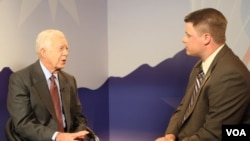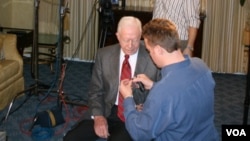If there is one thing I’ve learned over the last decade while interviewing former President Jimmy Carter, it is to be on time, and be ready.
The former Navy officer still lives by a military clock even at the age of 90, and is absolutely punctual. Through all of our interviews, he has never been late. Not once.
Being early is a different story.
“President Carter is ready for you now, if you could start early,” his staff member asks as myself and cameraman and producer Mike Burke are nearing the end of a frantic race to set up lights and cameras.
Fortunately, we are ready to start early, and for me, I’m eager to do so.
This will mark my 11th interview with President Carter, and comes amid many developments at the Carter Center, which he and Rosalynn - his wife of 68 years – serve as “lead volunteers.” There is a lot to talk about as President Carter enters his tenth decade on the planet, and to get a complete picture of what this entails, we’ve just spent the previous weekend visiting him in his hometown of Plains, Georgia, where he was born, still lives, and still teaches Sunday school at his local church.
If President Carter is one thing, it’s active.
When I first sat down to interview President Carter in 2006 during the controversial “Palestine: Peace not Apartheid” book tour, I will admit, I was nervous. I had read most of his 22 published books prior to our interview, and finished the last page of the Palestine book on the flight from New York to Chicago where the interview would take place.
It’s hard not to feel like you know the man after ingesting all that background and information, particularly with books like “An Hour Before Daylight” - a runner up for the Pulitzer Prize - which explores President Carter’s early rural life in Georgia during the Great Depression. For me, that book echoed a similar time in life for my own grandparents, who grew up on farms in rural Pennsylvania.
But despite the fact I felt well versed on the man and his past by reading his books, as well as commentary critical of some his actions and efforts at diplomacy, I wasn’t confident enough to ditch my notes and simply engage him in a discussion. There were a lot of distractions around me, not the least of which was a film crew producing a documentary about President Carter eventually titled “Man From Plains” directed by Academy Award winner Jonathan Demme. For the record, in spite of the all the effort and distraction, our interview did not make the final cut. Or the DVD. But I’m not bitter. Moving on…
After getting over the nerves, I got to the questions, and got through the 20-minute interview, and realized that I rarely, if at all, looked at the notes I had prepared. We simply had a conversation, and before I knew it, our time was up. And there was so much left to talk about.
I initially thought the handshake at the end of that interview signaled the end of my interaction with the former U.S. President. I assumed it would be the last time I would have the chance to sit down and discuss world events with the man who held the highest office of the land the day I was born.
But fate has wound a path around the United States that has put President Carter and I in the same room, face to face, on numerous occasions in the following years, thanks in part to the fact that he continues to be a prolific author, and an interview with VOA is a routine part of his book tours.
But discussing the latest book is only part of the discussion we have (and I do read each of the books he writes) because VOA broadcasts to many parts of the world where the Carter Center is actively engaged in “waging peace” fighting disease” and “building hope.” Talking to President Carter I know that sexual slavery is a continuing problem in the world, including the United States. Talking to President Carter I can now identify the symptoms of dracunculiasis and onchocerciasis, and I know that the Carter Center is eliminating the latter (River Blindness) and is on the verge of complete eradication of the former (Guinea Worm Disease.) Talking to President Carter I know which countries have had free and fair elections, and those that have not. Talking to President Carter I know that staff at the Carter Center are actively working on mapping the conflict in Syria using social media and “citizen generated information.” These aren’t just important to President Carter, they are important to our audience. And our world.
Each conversation with President Carter is more than just an update on these efforts - it is a window in to what keeps him going, now at the age of 90. His drive, passion, and energy seem endless.
In the course of our interviews, it is also clear that President and Mrs. Carter are very much in tune with each development of the organization, right down to each and every case of Guinea Worm left on the planet. Mr. and Mrs. Carter - along with the staff at the Carter Center - anxiously await news that the last case of Guinea Worm disease has been wiped from the planet, an accomplishment the world has only seen once before, when smallpox was eradicated. The end is within sight.
The truth of the matter is in talking with President Carter I’ve learned far more than the simple fact he is always on time. He’s punctual because there’s a lot to talk about. And because there is a lot to talk about, I’ve also learned since that first interview that I don’t need notes for our discussion, as long as I stay up to date, and read his books. I’ve also learned that his legacy extends far beyond a troubled presidency or a peace agreement in the Middle East. But what I’ve truly learned most through our discussions is that they come and go too quickly, and what I really need most when I sit down to talk to President Carter, is more time.






